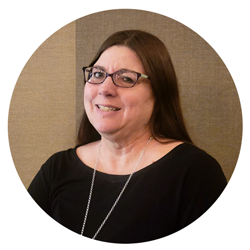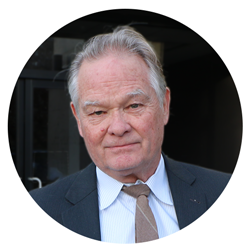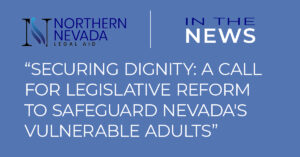The following article was initially published in the September/October Edition of The Writ, the official publication of the Washoe County Bar Association. To view the original publication CLICK HERE >
By, Taylor Marie Bassell
According to the Centers for Disease Control and Prevention, elder abuse is defined as “an intentional act or failure to act by a caregiver or another person in a relationship involving an expectation of trust that causes or creates a risk of harm to an older adult.” (emphasis added).1 An expectation of trust is the rational belief that a friend, relative, or caregiver should be relied upon to protect the interests of the older person. Although the belief is founded in rational expectations of care, the statistics of abuse alarmingly identifies the most common perpetrator as those closest to the victim. In fact, reports indicate 90% of abusers are family members,2 making abuse inside the home extremely common place.
Those in the Nevada elder law arena have advocated for years regarding the need for a modification of protective laws surrounding seniors and disabled individuals. Under these current laws, those who experience abuse from a sibling, grandparent, or grandchildren would be unable to seek judicial relief with a domestic violence restraining order.3 Without access to this, they can only seek protection civilly through the narrow category of a stalking or harassment protective order.
In 2021, the Aging and Disability Services Division (ADSD) co-authored a bill, A.B. 407, attempting to remedy the gaps in our current system. During the Assembly Committee on Judiciary’s April 1st, session, ADSD’s Chief Counsel, Jennifer Richards, and social worker Tammy Sever explained the necessity of the bill, including compelling stories of individuals who fall through the cracks.
“Karen Jones was a 45-year-old, mostly bedbound, and she allowed her friend to move in with her after the friend lost her job. The friend then allowed her boyfriend to move into the home. Both were addicted to drugs. Ms. Jones was being verbally abused, and they were financially exploiting her. Because Ms. Jones had mobility issues, transportation was difficult. Her situation did not currently fall within existing legal protective orders, so it was very difficult for Karen to get help.”4
Karen Jones’s story is sadly not unique. Many of our elderly and vulnerable population are forced to rely on those closest to them as support systems to survive, but what happens when that system betrays and fails them? Without any judicial recourse for this type of exploitation, Nevadans remain at risk as victims of financial, sexual, physical, and mental abuse.
Unfortunately, A.B. 407 failed to make it out of committee, but was revived in 2023 as A.B. 254. Both A.B. 407 and A.B. 254 intended to create a new kind of protective order for older and vulnerable persons, shielding them from abuse, neglect, exploitation, isolation, and abandonment. Under these proposed laws, a vulnerable person includes those with physical and mental disabilities, as well as those receiving care in a long-term facility, nursing home, and a variety of other care facilities. Importantly, the proposed laws included a built-in move-out order and extended the definition of those defined as family or a household member, filling in the gaps between the domestic violence and civil protective orders.
Currently, 15 states and 2 territories have some form of protective measure to restrain abusers and shield elder or vulnerable victims. Much like proposed A.B. 254, California’s Request for Elder or Dependent Adult Abuse Restraining Order contains an ex parte move-out order to remove the abuser from the residence. By circumventing the often-lengthy traditional unlawful detainer process, victims can secure their safety and the safety of their property immediately. This is critical in many instances where elder or vulnerable adults often live with caregivers, roommates, or family members who fall outside of the first degree of consanguinity. Often, securing the vulnerable person is the very first step taken by Adult Protective Services when constructing and executing their safety plans. Removing the abuser from contact with the victim not only protects the vulnerable adult physically, but also protects their assets and home from additional exploitation.
Again, A.B. 254 disappointingly failed to make it out of committee. With the fall of both bills, judicial relief for our elderly and vulnerable population remains out of reach, and the effects are startling. It is estimated that the direct annual cost on our healthcare system due to physical elder abuse is $5.3 billion.5 On the financial side, leading researchers estimate an annual loss of $2.6 billion by victims of financial crimes. Most startling, however, is the human cost associated with elder abuse. According to data published from the National Library of Medicine, mortality rates jump over 300% when elders face abuse.
Although an immediate solution is readily available, the advocacy by many in this field repeatedly fails, and the efforts continue to go unnoticed. By choosing to adopt elder abuse protections, Nevada can demonstrate its commitment to justice, dignity, and continued compassion for all members of its community. When we make a concerted effort to protect our most vulnerable, we all win.
Taylor Marie Bassell is an attorney at Northern Nevada Legal Aid where she works directly with seniors on site at Washoe County Senior Services. She has dedicated her life to indigent and disenfranchised populations, working closely with community partners to best serve her clients and improve access to legal services.
1 Jeffrey Hall et al., Elder Abuse Surveillance: Uniform Definitions and Recommended Core Data Elements for Use in Elder Abuse Surveillance, Version 1.0. National Center for Injury Prevention, Centers for Disease Control and Prevention, 2016, at 28, available at https://www.cdc.gov/violenceprevention/ pdf/EA_Book_Revised_2016.pdf.
2 World Health Organization. Elder Abuse: The Health Sector Role in Prevention and Response (June 2016), available at https://cdn.who.int/media/ docs/default-source/ageing/ea-infographicen-jun-18-web.pdf?sfvrsn=6dc7f167_2.
3 Nev. Rev. Stat. § 33.540 (2019).
4 Nevada Legislature, Committee on Judiciary, Minutes of the Meeting of the Committee on Judiciary (81st Session, 2021), at 31, available at https:// www.leg.state.nv.us/Session/81st2021/ Minutes/Assembly/JUD/Final/665.pdf.
5 Hall et al., supra at 15.
6 MetLife Mature Market Institute et al., Broken Trust: Elders, Family, and Finances (March 2009), at 7, available at http://elderabuselaw.org/ files/METLIFE%20Financial%20 Elder%20Abuse%20study.pdf.
7 XinQi Dong et al., Elder Self-neglect and Abuse and Mortality Risk in a Community-Dwelling Population. Journal of the American Medical Association, 2009, at 6, available at https:// www.ncbi.nlm.nih.gov/pmc/articles/ PMC2965589/pdf/nihms240437.pdf.
Are you a retired/semi-retired lawyer? Do you want to work 20 hours a week – receiving paid time off and qualifying for 401(k) matching – by representing adults in guardianship proceedings or children in foster care? We have a place for you! Please email careers@nnlegalaid.org.
Are you an out-of-state lawyer? Did you know you could be licensed in Nevada through working for NNLA? https://nvbar.org/licensing-compliance/admissions/








